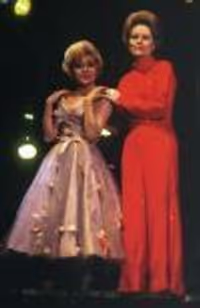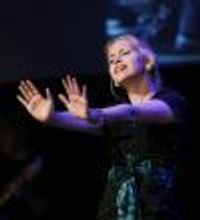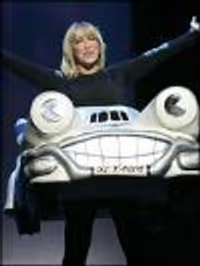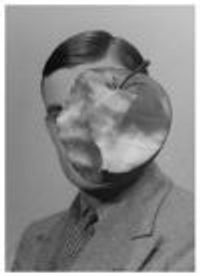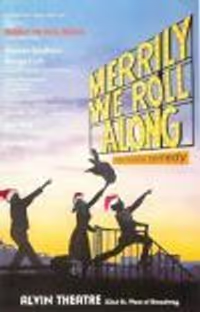The History of "Merrily We Roll Along"?
#1The History of "Merrily We Roll Along"?
Posted: 3/3/08 at 6:20pm
I was just listening to this show and absolutely love it, but realized that it is a show I know very little about.
Did anyone here see the original production? I know a major problem with the show is its presentation of the story in reverse, and I also remember hearing something about the cast wearing T-Shirts with their names on them because there were too many characters? Would anyone care to share their impressions and reccollections of the show, as well as speculation as to why it was such a failure?
-best12bars
"Sorry I am a Theatre major not a English Major"
-skibumb5290
#2re: The History of 'Merrily We Roll Along'?
Posted: 3/3/08 at 6:30pmThe show really isn't bad. I don't know why it was so badly reviewed. The new verson, in my opinion, does not improveon the original. I think it failed because it was really a work in progress in previews. It wasn't as polished as, let's say, Sweeney Todd was.
#2re: The History of 'Merrily We Roll Along'?
Posted: 3/3/08 at 6:43pm
I'm too young to have seen the original production, but I've read more than plenty about the show.
Some of the reasons given for the failure of the original:
-The cast's inexperience: in fact, Hal Prince and Stephen Sondheim loved the idea of the 'rawness' of these performers (Lonny Price was constantly chastised for being "too professional" and pulling attention from the other actors).
-Toxic Word-of-Mouth: the show did not have an out-of-town premiere due to the show's technical aspects, and so had to fix its problems in New York. Meanwhile, people were walking out in droves and telling everyone else how bad it was (even the New York Times got in on the game), and, even though the show was much, much better by the time it actually opened (though still nowhere near acceptable), the critics pretty much bashed it into the ground.
-The sets and costumes: Prince's original concept for the show's design was to have no sets at all (a la Our Town), but he finally agreed to have them after being told over and over again that no one would pay Broadway prices to see a show with no sets. So, in his words, "we tried to get sets that didn't look like they were there. Instead, they were there, and they were awful."
The costumes were also ugly and sometimes out-of-this-world (Lonny Price described the cast as looking like they came out of Bugsy), so Prince threw them all out and replaced them with sweatshirts and jeans.
-The writing: very confusing, didn't really establish character. Eventually, they had to insert speeches for the characters to speak directly to the audience in order to combat some of the confusion.
And there were plenty more problems.
-Nellie McKay on the 2006 Broadway production of The Threepenny Opera, in which she played Polly Peachum
#3re: The History of 'Merrily We Roll Along'?
Posted: 3/3/08 at 7:01pm
Merrily is covered in Ken Mandelbaum's wonderful book Not Since Carrie, in which he gives several reasons for its failure. The show ran for six weeks of previews, when it opened to poor reviews and closed in two weeks. Mandelbaum claims that the early previews were a mess and audiences walked out in droves, spreading bad word of mouth. Also, the cast was comprised mostly of teenagers, and they were much more convincing near the end (when they were playing their age) rather than in the beginning when they had to portray the bitter, cynical adults.
To quote Mandelbaum, "Though Merrily was indeed a much better show by the time it opened, numerous problems remained. It was hurt by its unattractive, gymnasium setting, with Erector-Set bleachers and lockers, and its costumes, with the cast in sweatshirts identifying the characters by their relation to Frank to combat audience confusion. Prince later admitted that he was never able to come up with a satisfying visual concept for the show; his original instinct-to have had not sets at all- would have been a better solution."
"Telling the story backward..tended to confuse and alienate Merrily audiences; it was difficult to get interested in or care about the characters. The audience was never shown how Frank got to be where he was at the beginning of the evening; many of the changes in the characters took place offstage, announced but not dramatized."
What Mandelbaum does assert, and I def agree with, is that the score is very strong. Maybe it will be one of those shows with an amazing score, but will never play well in performance (a al The Grass Harp). Perhaps with the right direction/concept it could succeed.
#4re: The History of 'Merrily We Roll Along'?
Posted: 3/3/08 at 7:04pm
Read the It's Still Backwards chapter of Zandan's book Sondheim and Co.
It is the best primer of Merrily available.
#5re: The History of 'Merrily We Roll Along'?
Posted: 3/3/08 at 7:42pm
I DID see the original production.
The show was Sondheim & Prince's first show after SWEENEY. It was also their first reunion with George Furth since COMPANY. They decided they wanted the Alvin (Now Neil Simon) theatre, so the hit musical ANNIE was sent packing. (More on that, later.)
Advance interest was very high even though except for knowing it was based on the 1934 play by Kaufmann and Hart no one knew much about it.
Prince's concept was that the students at Frank's Alma matter are acting out his life hence the young cast. He also directed the performers to act the piece as if they were doing a High School show, and without the sheen of seasoned professionals. He kept urging them to be "raw" in their performance style.
The NY Times did a feature story on the first day of rehearsal, and trhe advance sale was reportedly building.
The first preview attracted the usual "bitchy show queen" types who came prepared to hate it. Trims were made and the performances were polished, and while many individual scenes were playing well overall the show was not working.
After 3 weeks of previews it became clear they would not ready to open on Sunday November 1. The date was delayed first to Nov 8 then to Monday November 16. They replaced leading man James Weisenbach with Jim Walton. Choreographer Ron Field left and Larry Fuller came in to re-stage the dances. (This is when I saw the show...just after Walton took over.)
The show began with a bight lively Overture. The first scene (dropped from most subsequent revisals) had the 1980 graduating class of the Lake Forrest Academy welcoming their most famous graduate, the songwriter-turned film producer Frank Shepard as a guest speaker. THey perform the song e wrote for his own graduation 15 years earlier, "The Hills of Tomorrow." The students challenge his cynical speech urging them to face life realistically and becoming characters in Frank's life, wearing T-shirts with their names and/or functions emblazoned across the front.
The first flashback takes us to Frank's Bel-air home, a year earlier. We learn that Frank is unhappily married to Gussie, having an affair with a starlet, has given up songwriting for film production, is no longer speaking to Charley Kringis his former collaborator and best friend and their mutual friend Mary is an unhappy drunk.
Four years earlier Mary tries to arrange a reconciliation lunch between Frank and Charley, but her efforts failed and the two come to blows.
Two years prior, on a TV Talk show, Charley rails Frank for his love of money and diminishing creativity. Frank vows never to speak to Charley again.
Five years before that, Frank pleads with Charley and Mary to be patient while he accepts some lucrative offers. We also learn that Frank is having an affair with Gussie, the wife of his producer.
Two years earlier, Frank's first wife Beth is suing Frank for divorce citing infidelity. Their marriage that was once happy has slid into bitter acrimony. His friends try to cheer him up assuring him it will be better.
INTERMISSION
It is 1964 Frank and Charley's first Broadway musical opens, produced by Joe Josephson. Two years earlier at a party, Joe's wife Gussie urges Frank to give up on the show he and his partner had been laboring over for several years, and instead write a big commercial show for her and her husband. Frank agrees without consulting Charley first.
Two years earlier, Frank, Charley, Mary and Beth have written a small revue for a tiny village club. Joe Josephson comes to check it out and expresses interest in the songwriting team. Frank is about to marry Beth, who is pregnant.
A montage covers two years as Frank, Charley and Mary pursue their dreams. They decide to produce a revue and auditioning girl singers Frank meets Beth.
It is 1957. On a rooftop in lower Manhattan, best friends and roommates Frank And Charley meet Mary while waiting to catch a glimpse of Sputnik. The three express their dreams for the future.
Finally it is 1955. Frank and Charley are graduating. Frank is finishing his valedictory speech urging his classmates to "grow, to accomplish, to change the world." He then leads the class in singing the commencement song he and Charley have written: "The Hills of Tomorrow." Everyone smiles, the class picture is taken...and the curtain falls on a stage full of beaming, optimistic, youthful faces.
The reviews with one exception were all unfavourable. (The lone exception was Clive Barnes, who had previously hated COMPANY, FOLLIES, PACIFIC OVERTURES and had been mixed about NIGHT MUSIC AND SWEENEY. His review of MERRILY was a rave!) Frank Rich, who had just recently become the critic for the New York Times summed it up by praising Sondheim’s songs, “that soar, and linger, and hurt” but went on to say that “the show that contains them is a shambles.”
The other reviews were downright nasty, making fun of the performances, the score, the structure, the costumes…everything.
After 16 performances, it was gone. The original cast album was made the day after the final performance. That record encouraged Sondheim and Furth to re-examine the piece with James LaPine directing for the La Jolla playhouse. The west coast critics gave it good reviews but the authors felt it wasn’t quite right yet. (For this version the cast was older, the opening and closing graduation scenes were cut, and “That Frank” replaced the song “Rich and Happy”.)
There were more changes made for productions in Washington in 1990 and off-Broadway in 1994. The revised version as presented at the Shaw Festival in 2002 and also that same summer as part of the Sondheim Celebration. Both versions were well received, although some critics (and audiences) still had problems with the backwards structure.
But time has proven that the score is not and never was the problem. The current book is much tighter, and makes more efforts to foreshadow coming events as it spins backwards.
It may never be a big blockbuster, gargantuan hit. But it is a far richer show than many others that have run longer. Liek ANNIE.
ANNIE, booted from the Alvin, moved across the street to the ANTA (now Virginia) theatre but could only stay there a short time because the new musical OH BROTHER was booked to open there. ANNIE moved to the Eugene O’Neill but again for only a short stay because the O’Neill was booked for a revival of LITTLE ME. Finally the Rex Harrison revival of MY FAIR LADY at the Uris (now Gershwin) posted a closing notice and ANNIE moved there just before Christmas 1981, leaving a trail of destruction behind her: MERRILY WE ROLL ALONG folded after 16 performances, OH BROTHER closed after just 3, while the revival of LITTLE ME barely lasted a month. The lesson: Don’t boot a hit show out of your theatre!!
Cast albums are NOT "soundtracks."
Live theatre does not use a "soundtrack." If it did, it wouldn't be live theatre!
I host a weekly one-hour radio program featuring cast album selections as well as songs by cabaret, jazz and theatre artists. The program, FRONT ROW CENTRE is heard Sundays 9 to 10 am and also Saturdays from 8 to 9 am (eastern times) on www.proudfm.com
#6re: The History of 'Merrily We Roll Along'?
Posted: 3/3/08 at 7:49pm
frontrowcentre-
Barnes LOVED Night Music and Sweeney, just to correct you there.
BkCollector
Broadway Star Joined: 2/6/08
#7re: The History of 'Merrily We Roll Along'?
Posted: 3/3/08 at 7:56pm
Im so tired of people quoting Not Since Carrie, its not a bible, its a reference guide at most.
I read it for dates and names and places, but NEVER or Mandlebaum's hackneyed observations, I'd rather read the back of a cereal box.
#8re: The History of 'Merrily We Roll Along'?
Posted: 3/3/08 at 8:00pmNOT SINCE CARRIE is a great overview that surveys many Broadway flops and Mandelbaum gets his facts correct. About the only thing wrong with the book is that there isn't more of it, or a follow-up volume.
Cast albums are NOT "soundtracks."
Live theatre does not use a "soundtrack." If it did, it wouldn't be live theatre!
I host a weekly one-hour radio program featuring cast album selections as well as songs by cabaret, jazz and theatre artists. The program, FRONT ROW CENTRE is heard Sundays 9 to 10 am and also Saturdays from 8 to 9 am (eastern times) on www.proudfm.com
BkCollector
Broadway Star Joined: 2/6/08
#9re: The History of 'Merrily We Roll Along'?
Posted: 3/3/08 at 8:04pmIts a great book inasmuch as its the only place where all this info is in one place (besides the internet now) but Mandelbaum's writing style and pseudo journalistic efforts are very poor. I always find myself trying to wade through his opinions (who needs them) to get to the facts.
Unknown User
Joined: 12/31/69
#10re: The History of 'Merrily We Roll Along'?
Posted: 3/3/08 at 8:05pm
Well that may be (I disagree, BTW) but he's the only one covering the territory, so he's all we've got.
I saw a revised version in Chicago not long after the show opened (and closed) and found it...interesting. The score is truly amazing and the script...well, it's still backwards.
Interesting to read that in Moss Hart's day the "Backwards" thing was a bit of a coup- but the show still didn't run.
#11re: The History of 'Merrily We Roll Along'?
Posted: 3/3/08 at 8:18pmI'm a big fan of Not Since Carrie! It has introduced to me to so many great shows/scores that I would never have known about. I find Mandelbaum's writing style to be clear, concise and well-researched. What I actually enjoy the most about his writing in both Not Since Carrie and A Chorus Line and the Musicals of Michael Bennett, is that his love of the Broadway musical really shines through. His affection and enthusiasm for his subject material is just so infectious. I agree with frontrowcentre that there needs to be a revised edition of Not Since Carrie.
BkCollector
Broadway Star Joined: 2/6/08
#12re: The History of 'Merrily We Roll Along'?
Posted: 3/3/08 at 8:22pm
Whizzer, thats my problem with him. He's too entrenched in loving the artform to be objective at all.
Its fine to be a fan, but to be a scholar you need to be objective, and he is not, which is why he's not a scholar.
#13re: The History of 'Merrily We Roll Along'?
Posted: 3/3/08 at 8:38pm
Does he ever claim to be a scholar?
Or is he merely someone who appreciates musical theatre and wants to survey some of the art form's more notable misses?
He makes it pretty clear from the get-go that his book is fact AND opinion.
He knows he is writing for people just like him.. fans of the musical theatre art form ...not some imagined class of intellectuals who don't care about the art for at all.
For a man whose work introduced many of us to worthy but long forgotten examples of musical theatre .. I say "Hats Off."
If you are interested in a scholarly critique of Merrily. You can read Joanne Gordon's Art Isn't Easy. But like most "scholarly" critiques the book is a dull read.
I'm rambling...
#14re: The History of 'Merrily We Roll Along'?
Posted: 3/3/08 at 8:38pm
Hmm I think I am on the same page with you but would prefer MORE of his opinion, and for him to delve a bit deeper into each show's failings.
Sidetrack here: Just saw a local group do THE RINK - another show that had a brief run but not at all due to the writing. It had a reputation for being dour and heavy and not terribly entertaining. Nonsense. It is very well written...if anything the book is better than the score. Though it touches on serious issues, it has a lot of humour and a great deal of heart. And like, MERRILY, it deserved a much better reaction than it was initially given. Unlike MERRILY, THE RINK isn't likely to get a second chance.
Cast albums are NOT "soundtracks."
Live theatre does not use a "soundtrack." If it did, it wouldn't be live theatre!
I host a weekly one-hour radio program featuring cast album selections as well as songs by cabaret, jazz and theatre artists. The program, FRONT ROW CENTRE is heard Sundays 9 to 10 am and also Saturdays from 8 to 9 am (eastern times) on www.proudfm.com
#15re: The History of 'Merrily We Roll Along'?
Posted: 3/3/08 at 8:41pm
Front, did they use the original Broadway script for the production you saw? Or was it a revised version?
BkCollector
Broadway Star Joined: 2/6/08
#16re: The History of 'Merrily We Roll Along'?
Posted: 3/3/08 at 8:43pm
BFB
Thank you for pointing that book out to me, just reading the first few pages on Amazon is fun!
I will definitely by this book.
Btw, does anyone know where there is a book that does Schenkerian Analysis of Sondheim's music>
#17re: The History of 'Merrily We Roll Along'?
Posted: 3/3/08 at 8:50pmTHE RINK used a slightly revised script. (I have the original as published by French's Musical Library in the late 80s.) Only major difference is that is is Bobby Petrillo (not Uncle Fausto) who reveals to Angel that her father is not dead, and there were some changes made to "All the Children in a Row" so instead of ending with a big note it segues back into the first few lines of the intro to "Colored Lights" and then into dialogue. The production was really well acted and I actually went back to see it a second time.
Cast albums are NOT "soundtracks."
Live theatre does not use a "soundtrack." If it did, it wouldn't be live theatre!
I host a weekly one-hour radio program featuring cast album selections as well as songs by cabaret, jazz and theatre artists. The program, FRONT ROW CENTRE is heard Sundays 9 to 10 am and also Saturdays from 8 to 9 am (eastern times) on www.proudfm.com
#18re: The History of 'Merrily We Roll Along'?
Posted: 3/3/08 at 8:51pm
BFB- I have also read Art isn't Easy, and I agree, that although she offers some interesting insights, it can be terribly dull!
BkCollector- I never claimed that Mandelbaum was a "scholar." I don't have any problem quoting him because I think his facts/opinions are sound and well-supported. You say that he is not objective enough, but isn't art criticism in itself subjective. Even Joanne Gordon's Art isn't Easy, while "scholarly" is clearly based on a deep respect and love of Sondheim's works.
#19re: The History of 'Merrily We Roll Along'?
Posted: 3/3/08 at 8:52pmThanks.. Wasn't there talk of a Doyle production with LuPone?
#20re: The History of 'Merrily We Roll Along'?
Posted: 3/3/08 at 8:57pm
Well there is always "talk." Sometimes just wishful thinking. It might work but the wreckers are really overworked as it is.
MERRILY, I don't think, will benefit from teh actor/musician concept. It would distract too much, although there are ways that Perhaps Frank could accompany all teh songs from his piano.
Cast albums are NOT "soundtracks."
Live theatre does not use a "soundtrack." If it did, it wouldn't be live theatre!
I host a weekly one-hour radio program featuring cast album selections as well as songs by cabaret, jazz and theatre artists. The program, FRONT ROW CENTRE is heard Sundays 9 to 10 am and also Saturdays from 8 to 9 am (eastern times) on www.proudfm.com
#21re: The History of 'Merrily We Roll Along'?
Posted: 3/3/08 at 9:43pmI think the concept would be something like we are watching Frank and Mary and Charlie's revue.
--http://www.benjaminadgate.com/
#22re: The History of 'Merrily We Roll Along'?
Posted: 3/8/08 at 3:38pm
Having seen both versions several times, I think Merrily is much better with the school graduation scenes which provide a tension and an edge to the piece.
The backwards thing has never been a problem in the UK, possibly because we have JB Priestley's plays that also play with time. The 2001 Donmar production (which apparently used the graduation scenes without permission) provided what was for me a thrilling and great theatrical moment when, as the class valedictorian takes the jacket passed to him by the older Franklin Shepherd, the clock on the wall behind them starts to go backwards. The acting in this production (with Daniel Evans collecting an Olivier as Charley) was absolutely superb, right down to the finest detail.
Th John Doyle production of Merrily is just completing its run at the Watermill Theatre in Newbury, Berkshire. Links to a couple of excerpts from that production below:
http://www.newburytoday.co.uk/News/Article.aspx?articleID=6094
http://www.itvlocal.com/meridian/news/?&void=148453
#23re: The History of 'Merrily We Roll Along'?
Posted: 3/8/08 at 6:01pmI would love to see a Doyle directed version of Merrily. I think it might actually give the show that little something that it was always missing.
"Leave Walt Disney Theatricals new sparkling production of The Little Mermaid on Broadway alone!!!"
lakezurich will be played by Paul Groves in the BWW musical
#24re: The History of 'Merrily We Roll Along'?
Posted: 3/8/08 at 7:06pm
If you want to know more about Merrily, this article is DEFINITELY the next thing you should read:
http://www.broadway.com/gen/Buzz_Story.aspx?ci=20645&pn=1
Videos


